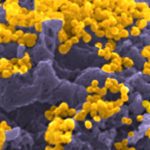Lien vers Pubmed [PMID] – 31279905
J. Hepatol. 2019 Jul;
BACKGROUND & AIMS: Hepatitis C virus (HCV) infection contributes to the development of autoimmune disorders such as cryoglobulinemia vasculitis (CV). However, it remains unclear why only some HCV-infected individuals develop CV. HCV-CV is characterized by expansions of anergic CD19CD27CD21 atypical memory B cells (AtM). Here, we report the mechanisms by which AtM participate to HCV-associated autoimmunity.
METHODS: Phenotype and function of peripheral AtM were studied by multi-color flow cytometry and co-culture assays with effector T cells and regulatory T cells in twenty chronicallyHCV-CV patients, 10 chronicallyHCV-infected patients without CV and 8 healthy donors. We performed gene expression profile analysis of AtM stimulated or not by TLR9. Immunoglobulin gene repertoire and antibody reactivity profiles of AtM-expressing IgM antibodies were analyzed following single B cell FACS sorting and expression-cloning of monoclonal antibodies.
RESULTS: We show TbetCD11cCD27CD21 AtM B-cell expansions in HCV-CV patients as compared to HCV controls without CV. TLR9 activation of AtM induces a specific transcriptional signature centered on TNFα overexpression, and an enhanced secretion of TNFα and rheumatoid factor-type IgMs in HCV-CV patients. AtM stimulated through TLR9 promote type 1 effector T-cell activation and reduce the proliferation of CD4CD25CD127FoxP3 regulatory T cells. AtM expansions display intraclonal diversity with immunoglogulin features of antigen-driven maturation. AtM-derived IgM monoclonal antibodies do not react against ubiquitous autoantigens or HCV antigens including NS3 and E2 proteins. Rather, AtM-derived antibodies target unique epitopes on the human IgG Fc region and possess rheumatoid factor activity.
CONCLUSION: Our data strongly suggest a central role for TLR9 activation of AtM in driving HCV-CV autoimmunity through rheumatoid factors production and type 1 T-cell response.
LAY SUMMARY: B cells are best known for their capacity to produce antibodies, which often play a deleterious role in the development of autoimmune diseases. During chronic hepatitis C, deleterious B cells proliferate and can be responsible for autoimmune symptoms (arthritis, purpura, neuropathy, renal disease) and/or lymphoma. Direct-acting antiviral therapy clears the hepatitis C virus and eliminates deleterious B cells.


